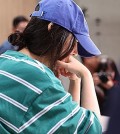- California Assembly OKs highest minimum wage in nation
- S. Korea unveils first graphic cigarette warnings
- US joins with South Korea, Japan in bid to deter North Korea
- LPGA golfer Chun In-gee finally back in action
- S. Korea won’t be top seed in final World Cup qualification round
- US men’s soccer misses 2nd straight Olympics
- US back on track in qualifying with 4-0 win over Guatemala
- High-intensity workout injuries spawn cottage industry
- CDC expands range of Zika mosquitoes into parts of Northeast
- Who knew? ‘The Walking Dead’ is helping families connect
S. Korean government to examine all toxic substances in chemical products by next year

This photo taken on April 4, 2016, shows the facade of the Seoul metropolitan government’s building in central Seoul. (Yonhap)
SEOUL (Yonhap) — South Korea’s Ministry of Environment on Tuesday said it will examine all potentially toxic substances contained in household chemical products by next year, amid its stepped-up efforts to assuage growing public health concerns.
The ministry said that it will first do a survey on frequently used chemical products that pose potential health hazards this year.
For this, the ministry will ask some 8,000 firms, which manufacture or import chemical products, to submit to the government their documents — delineating any toxic substances in their products — by the first half of this year.
After categorizing those potentially hazardous substances, the ministry plans to begin evaluating the extent to which those substances affect people’s health in the second half of the year.
The ministry also plans to sign agreements with major manufacturers and importers of chemical products, such as air fresheners and deodorants, to ensure their safety.
From these firms, the ministry will seek to receive their individual reports on the safety of their products sometime in the second half of the year and unveil its evaluations of the reports to the public later.
Starting next year, the ministry will expand its examination of chemical products to even include those that are not categorized as posing health risks to the public, as well as industrial and electronic goods.
Meanwhile, the Seoul metropolitan government said it will conduct a full-scale investigation to see if any city-run preschools and nursing homes have used allegedly toxic humidifier disinfectants.
The municipality said it will look into city-run and public preschools, nursing homes and welfare institutions for the physically challenged to check their past records of using humidifier disinfectants, and call on victims to report their cases.
It also plans to launch a program to offer “continued” psychological treatment and counseling to the victims and conduct an analysis of chemical products, such as air fresheners, deodorants and laundry softening agents to see if they pose any health risks.
These series of moves come amid the city’s stepped-up efforts to address public anxiety over toxic chemicals used to clean household humidifiers. According to the Korea Environmental Industry and Technology Institute under the environment ministry, more than 40 Seoul citizens have been confirmed as victims of toxic humidifier disinfectants.
“As there may be more victims than the number that has so far been confirmed, we will continue to find victims (to support them),” a Seoul municipality official said, declining to be named.











